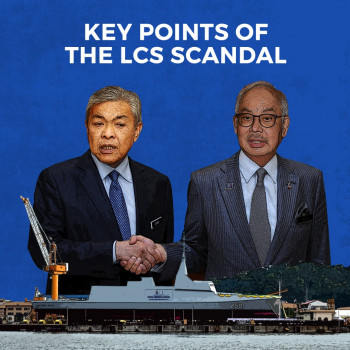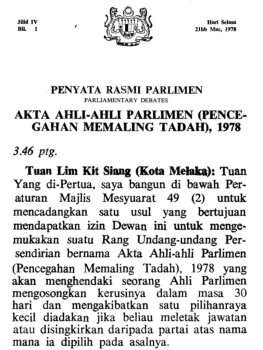2014 has come to an end and The Rocket looks back at some of the most notable incidence that left a mark on Malaysia. Here we count down the year’s top 5 most crushing moments for the nation. Do you agree with our list?
5) The death of Karpal Singh
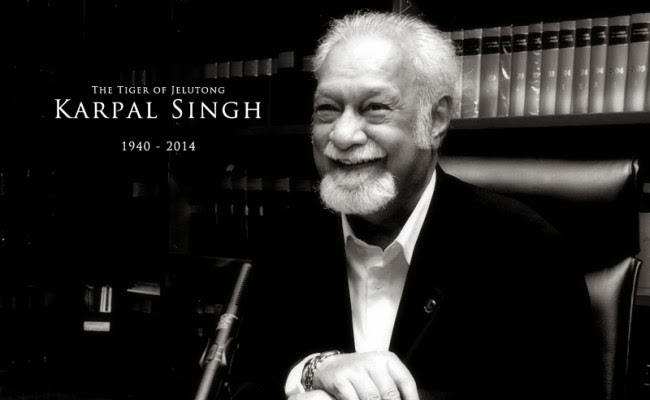 News of his tragic death hit a nerve with all Malaysians who fondly remembered him as the infamous Tiger of Jelutong. It came as no surprise that his ill fated accident on the North South Highway highway affected Malaysians from all walks of life.
News of his tragic death hit a nerve with all Malaysians who fondly remembered him as the infamous Tiger of Jelutong. It came as no surprise that his ill fated accident on the North South Highway highway affected Malaysians from all walks of life.
Perceived as a fierce DAP leader and an astounding law expert, Karpal was steadfast in defending Malaysia’s secular constitution just as he came to the aid of many who required legal help. From defending the late Teoh Beng Hock to opposition leader Anwar Ibrahim in the court of law while refusing to accept a single cent as payment, Karpal Singh was dear to the heart of Malaysians aspiring for a just and fair judiciary.
Despite his strong stand against the implementation of Hudud law, for which he was seen as being anti – Islam by some quarters, this notion is easily dispelled when witnessing his outspokenness in defending a Muslim girl in Singapore who was not allowed to wear a hijab to school.
What no one expected was the grand scale of his send off during his funeral on 20 April, 2014 in Penang. Tens of thousands of people crowded his home,and the streets to honour the fallen hero one last time as the hearse carry his body over the roads of Penang. Ordinary Malaysians, politicians, and his peers stood hand in hand chanting his name while other yelled “Tiger! Tiger! Tiger!” as his body made its way to the crematorium. An icon in his own right, it would be a long time until Malaysians see another with the same ferocity and heart as the late Karpal Singh.
4) UMNO’s “Cirque de Generale Assemblee”
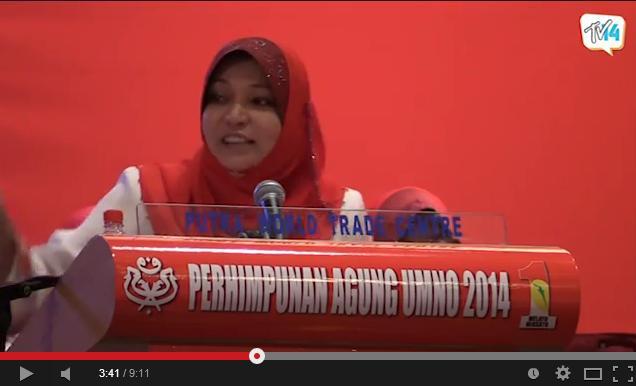 On November 2014, the “circus” came to town. The UMNO General Assembly this year saw a rise in race bashing, almost as if moderate Malaysia did not matter in the eyes of UMNO. leaders who addressed the crowd did not shy away from insinuations and derogatory name-calling when accusing the Chinese community in Kedah of allegedly burning the Quran page by page (which turned out to be false), or refering to Indians as “Keling” right under the nose of the Prime Minister Najib Razak.
On November 2014, the “circus” came to town. The UMNO General Assembly this year saw a rise in race bashing, almost as if moderate Malaysia did not matter in the eyes of UMNO. leaders who addressed the crowd did not shy away from insinuations and derogatory name-calling when accusing the Chinese community in Kedah of allegedly burning the Quran page by page (which turned out to be false), or refering to Indians as “Keling” right under the nose of the Prime Minister Najib Razak.
When opposition leaders like Lim Kit Siang exposed the supposed Quran burning incident as a lie and demanded for an apology from the UMNO wanita leader who publicly made the claim, she refused to apologize and continued with her tirade of hate, puting the blame on “racist and chauvinist leaders who have not stopped insulting Malays and Islam”.
The event also witnessed a perceived moderate among UMNO ranks, Youth and Sports Minister Khairy Jamaluddin, reminding non-Malays to “honour the social contract and not question the position of Malays”. He however, failed to say who exactly he was refering to; leading opposition leader to say that it was a just another attempt to create a “bogeyman” to spread fear amongst the Malay community.
The circus did not end there, the coup de grace came during the announcement by Najib Razak that the Sedition Act, which he promised to repeal in 2012, would stay and be strengthened so that those who insult the religion of Islam and groups who call for the secession of Borneo states would not go unpunished. His fiery announcement came after a video montage of incidents, mostly online, where the public had insulted Islam and Malays.
His speech was received by a standing ovation and thunderous applause by the delegates present.
3) Selangor MB crisis
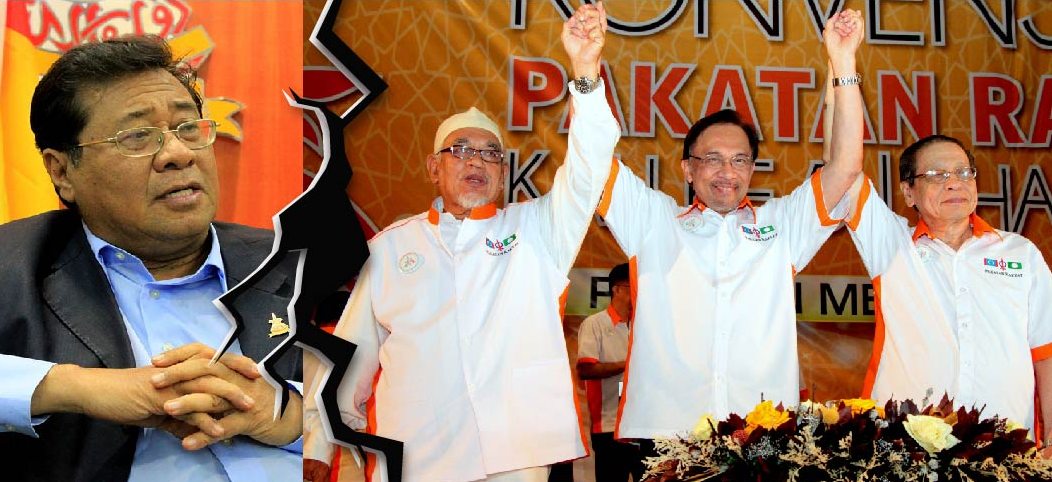 After refusing to step down as the MB of Selangor, Khalid Ibrahim was let go by his party, Parti Keadilan Rakyat. Pakatan Rakyat had intended to replace him with PKR’s party president, Wan Azizah Wan Ismail, based on the reason that Khalid was making administrative decisions unilaterally without consulting Pakatan leaders.
After refusing to step down as the MB of Selangor, Khalid Ibrahim was let go by his party, Parti Keadilan Rakyat. Pakatan Rakyat had intended to replace him with PKR’s party president, Wan Azizah Wan Ismail, based on the reason that Khalid was making administrative decisions unilaterally without consulting Pakatan leaders.
It was later exposed that Khalid had some “financial issues” related to a debt with Bank Islam. This put in question Pakatan Rakyat Selangor’s credibility for endorsing the MB after GE 13. Even Pakatan Rakyat’s supporters were divided on the issue, whether to support Khalid or his ousting.
However, Khalid did lose the mandate of his party that got him elected as the Selangor MB after Pakatan Rakyat was voted into power by the people of Selangor. It was based on this reasoning, that Pakatan with the support of PKR and DAP decided to demand that Khalid step down graciously. His secession took a turn for the worse when PAS, helmed by Hadi Awang, asked that he remain as MB. Pro-government news portals also seemed to be taking Khalid’s side; a curious solidarity between BN and an opposition leader.
A rift could then be seen within Pakatan Rakyat, where PAS’s actions threatened Pakatan Rakyat and its control over the Selangor State.
Albeit the calm after the storm, the crisis exposed a profound weaknesss of the Pakatan coalition. Netizens remembered the viral whatsapp message from PAS’s “AJK PAS Pusat” where its operations director Mohd Zuhdi Marzuki had said that in a hypothetical scenario,that if Khalid, 12 UMNO reps, 2 PKR reps and their 15 PAS reps were to join forces in Selangor, they would create a simple majority in Selangor – which would make it easier to flick off “DAP issues of churches, non- Muslims, raids, Allah”. He added in his infuriating posting, that this would return the political power of Malay-Islam by re-delineating the state borders. He said that this would enable them to ignore non-Muslim voices like before.
The Whatsapp leak had far reaching implications, it questions whether the Islamic party’s support for Khalid was for a fiendish ulterior motive eluding the public.
2) Monsoon floods
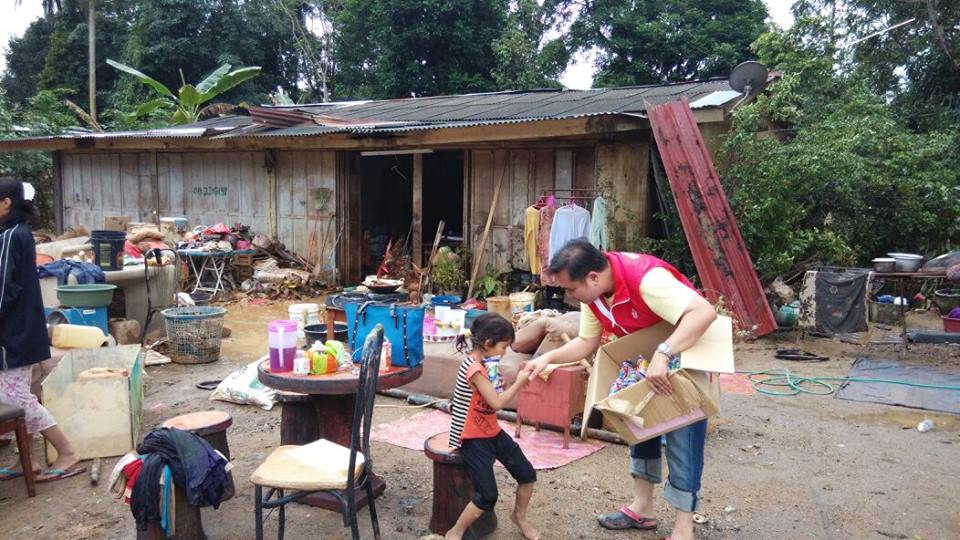 As in the time of writing, the death toll in flood-affected states have reached 21. A total of 237,000 victims are displaced from Kelantan, Terengganu, Pahang, and East Johor deeming this as the worst flood in decades.
As in the time of writing, the death toll in flood-affected states have reached 21. A total of 237,000 victims are displaced from Kelantan, Terengganu, Pahang, and East Johor deeming this as the worst flood in decades.
Totally unprepared, the state and federal governments have scrambled to provide aid but have refrained from declaring a state of emergency. According to Prime Minister Najib Razak, declaring so would absolve insurance companies from paying compensation.
DAP’s Petaling Jaya Utara MP, rubbished the claim, saying that insurance companies do not insure damages when faced with natural disasters.
A state of emergency would entitle the government to mobilize all their forces including the army to the areas affected, instead of the comparative trickling in of aid as currently seen. If declared, it is believed that the government would have to spend much more money compared to the RM 500 million that it had pledged for aid. DAP’s Seremban MP Anthony Loke, who led an aid charge to Kelantan said this sum was inadequate to rebuild the lives of those devastated by the natural disaster.
Opposition leaders on the ground have shared that people were forced to eat instant noodles soaked in rain water, because of total water and electricity outages.
Affected by the destruction of lives, ordinary Malaysians have taken it upon themselves to personally provide aid to the stranded victims. These Malaysians are not from established organizations or non-governmental bodies; just good samaritans organizing donation drives online, and collecing food and transporting them to the flooded zones.
“We are no experts, we have no money and we are not into movements or any cable link. We are simple public people just like you,” said Syed Azmi Alhabshi from Taman Tun Doktor Ismail.
“This is a crisis project and once it’s done, we pray hard that we actually made a difference. Recognition or not, is not our end game.” he added.
Aside from him, others have contributed trough NGO’s, Hypermarket initiatives such as Tesco, and even DAP collection centres. On its Facebook page, Tesco thanked shoppers for the overwhelming response to their donation drive. DAP also thanked all who donated to their relief fund, that recorded RM 220, 324 at 12 pm yesterday.
1) Flight tragedies
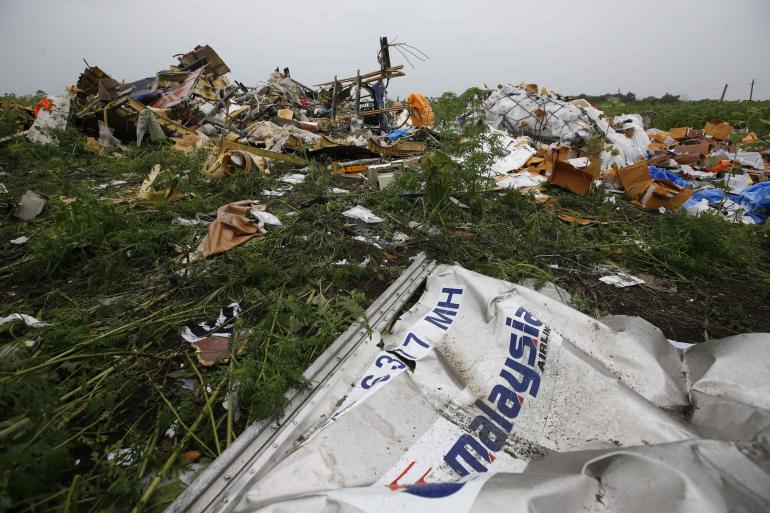 March this year, Malaysia and the world were woken up by one of the most mysterious flight disappearances in history. 239 passengers who boarded the plane and the plane itself had literally gone missing in thin air. All we know of the plane, is that the flight “ended in the Indian Ocean” and that was how the Prime Minister had put it when announcing to the media.
March this year, Malaysia and the world were woken up by one of the most mysterious flight disappearances in history. 239 passengers who boarded the plane and the plane itself had literally gone missing in thin air. All we know of the plane, is that the flight “ended in the Indian Ocean” and that was how the Prime Minister had put it when announcing to the media.
The tragedy shook many and awakened many questions about aviation safety. It also opened the door for the Malaysian government to demonstrate transparency when questioned by floors of international journalists – at which they had failed miserably.
From reneging on statements made and being perceived as a government that is “hiding information”, it was a tough time for Malaysia. According to a survey done by the Malaysian Insider, more than fifty percent of Malaysians felt that the government was hiding information about the missing plane.
According to the Australian Transport Safety Bureau (ATSB), which has led the search in the Southern Indian Ocean, scanning the area would take up to May 2015 to be completed. Even then, finding conclusive evidence for the crash (if it did indeed crash), would be far from over.
To make things worse for Malaysian Airlines, another plane was to suffer a terrible fate. This time, at the rebel infiltrated Russia-Ukraine border. It is believed that the plane was shot down by pro-Russian rebels with a surface to air missle, killing all 298 people onboard.
Malaysians could not believe that such a tragedy had occurred twice for the Malaysian Airlines. Key in understanding the causes of the crash was the two black boxes in the hands of the rebels.
Prime Minister Najib Razak was successful in retrieving the black boxes from the rebel leader Alexander Borodai, which garnered praise from opposition leaders such as Lim Kit Siang and de facto Opposition Leader Anwar Ibrahim.
“Malaysians must remain united on the MH17 disaster, continue to give full backing to Najib and the government to demand swift justice against the perpetrators of this crime against humanity in the murder of 298 passengers and crew on board in cold blood on July 17, 2014,” said Lim.
Currently, international investigations to find out who was responsible for the crash led by the Dutch have been hampered due to ongoing civil war and Russian intransigence. In November this year, the investigations were extended by nine months until August 2015. Those identified as the perpetrators would be responsible for crimes against humanity.
That was not the last time we would hear about another airline crash. This December, Air Asia flight QZ8501 crashed into the Java sea, on its way from Surabaya to Singapore. 162 people were on board the flight.
The crash was a dent in the otherwise pristine name of Air Asia, a Malaysian budget airline with a great safety track record. Tony Fernandez, Air Asia founder, apologized to the families of the victims of the crash and promised to compensate them.
Investigations into the cause of the incident are still underway and the search for the aircraft and its passengers remains ongoing.
Though commercial aircrafts remain the safest form of travel today, it is unclear if public fear of flying and lack of confidence airlines as a safe mode of transportation would result from these repeated crashes and disappearances of Malaysian planes. -The Rocket


